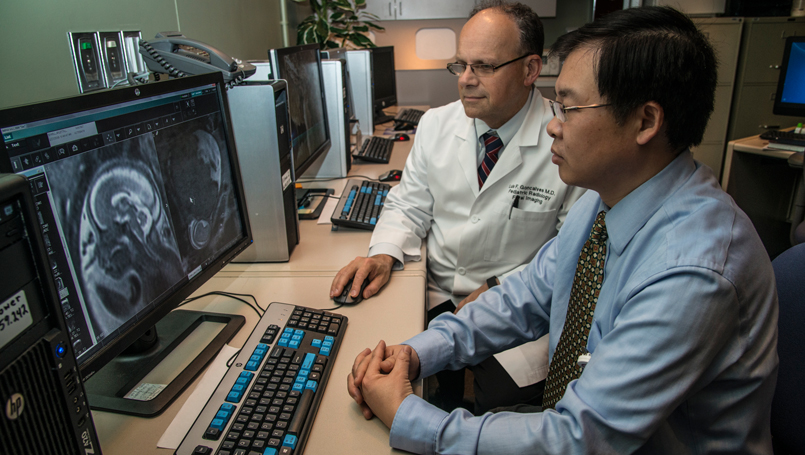Tuesday, March 15, 2016
 “Isn’t this beautiful?” Dr. Luis Goncalves said with admiration.
“Isn’t this beautiful?” Dr. Luis Goncalves said with admiration.The co-medical director of the Division of Fetal Imaging and pediatric radiologist at Beaumont Hospital, Royal Oak, was gesturing to a detailed intrauterine ultrasound, depicting the graceful and intricate network of vessels, providing blood flow to the placenta.
“It’s beautiful, indeed,” agreed Yuxiang Zhou, medical physicist in the Department of Diagnostic Radiology, also at Beaumont, Royal Oak.
Passionate and inspired representatives of Beaumont, Royal Oak’s Departments of Obstetrics and Gynecology and Radiology, the pair were recently awarded a $1.7 million grant from the Eunice Kennedy Shriver National Institute of Child Health & Human Development of the National Institutes of Health (NIH) to investigate fetal growth restriction, which leads to low-birth-weight babies.
The grant is part of a $4.4 million NIH grant awarded to a partnership with the University of South Florida and Beaumont’s Departments of Obstetrics and Gynecology and Diagnostic Radiology and Molecular Imaging.
The principal investigators at USF are Anthony Odibo, M.D., a noted clinical scientist and researcher and Charlie Lockwood, M.D., Dean of the School of Medicine, also a leading fetal medicine researcher.
Research will focus on fetuses not growing as expected. Although about 10 percent of fetuses measure smaller than expected for gestational age, only about 50 percent of these are affected by intrauterine growth restriction.
Babies who experience intrauterine growth restriction due to placental abnormalities are at increased risk of dying in the womb or after birth. Survivors may experience prolonged hospitalization and are also at increased risk of later neurological complications. Even those babies who do well initially are at increased, long-term risk of obesity, diabetes and hypertension. The end goal is to discover imaging signs which correlate with placental dysfunction and may identify babies at highest risk for growth restriction early on, leading to the development of prevention and/or early treatment strategies. Blood and placental tissue will be collected to look for biomarkers, substances in blood and tissue that may be present in conjunction with disease.
“We hope our research can lead to the development of imaging tests that can help us understand what is happening to the placentas of these fetuses early in gestation -- even before growth restriction develops,” Goncalves said.
The research team at Beaumont is currently seeking 200 women in the first trimester of pregnancy to participate in the study.
Researchers will use newer technology, known as “Superb Microvascular Imaging,” to capture three detailed images of placental perfusion by ultrasound throughout each woman’s pregnancy.
Women whose pregnancies are complicated by fetal growth restriction will also have an MRI of the placenta during their third trimester. These images will be used by researchers to compare blood flow oxygenations between placentas of appropriately progressing and growth restricted babies.
“For those with established intrauterine growth restriction, our objective is to find out if evaluation of placental oxygenation by MRI will help identify with greater precision those placentas that are not capable of supporting the fetus,” Goncalves said.
Separating babies who are small but normal from those who are truly growth restricted, then determining how to best manage them, in terms of surveillance and timing of delivery, are the key challenges, Zhou said.
Only 18 to 20 percent of research teams who apply for NIH grants receive an award.
Interested parties may contact research coordinator Evie Russell, RN, at 248-898-5388 or Dr. Luis Goncalves at 248-898-2068.
